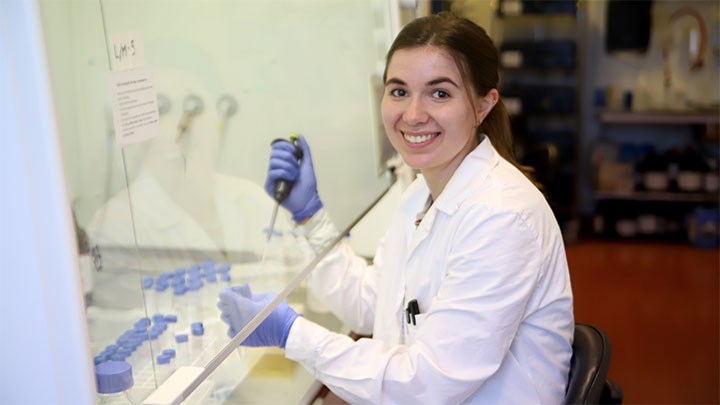Master’s programme opened the door for doctoral studies in Örebro: “A mix of city life and nature”

Welmoed Nauta hopes her PFAS research will eventually improve the environment.
Combining her interest in the environment and chemistry with Örebro being in the heart of Sweden attracted Welmoed Nauta from the Netherlands to Örebro University.
“I love being able to step outside and be in nature,” she says.
Read more about master’s and doctoral studies at Örebro University.
A research career was not an obvious choice for Welmoed Nauta, who earned her bachelor’s degree in chemistry at Avans University of Applied Sciences in the Netherlands. Instead, a semester abroad in Helsinki, Finland, sparked her interest in environmental forensics and a desire for more international experiences.
“I wanted to discover a new country and a new culture and happened to stumble over Örebro University’s master’s programme in environmental forensics. It’s an exciting combination of my interest in environmental science and chemistry. Along with Örebro being in the middle of Sweden, I thought it’d be perfect to make travelling around easy, to see more of the country,” explains Welmoed Nauta.
Classmates from all over the world
After being accepted to the two-year international master’s programme, she soon discovered more advantages of Örebro:
“I’ve mostly lived in larger cities that are crowded and hectic. Here, nature’s just around the corner – a sense of calm. So, Örebro’s mix of city life and nature is perfect for me.”
Her classmates are from Sweden, Pakistan, and various countries in Africa.
“Together, we did a lot of field studies, something I appreciated a lot. It was a mix of fieldwork, lab work, and theory in a perfect combination,” she says.
Studies PFAS in water and soil
During the summers, Welmoed Nauta worked in the chemistry lab at Örebro University. This is where the idea that research could be something for her was hatched. She was appointed to a doctoral studentship in environmental forensics at the School of Science and Technology in May. Four years of doctoral studies await, during which she will study PFAS remediation, which is the clean-up of the water and soil.
“I’m particularly looking forward to spending six months in Japan next year, where I’ll be doing field studies and performing lab work,” she says.
Transitioning from regular student life to becoming a doctoral student is a big step.
“It’s been a bit scary with all the new things, while at the same time, it’s nice that I already know many researchers and have worked in the lab here. The big difference is that I’ll need to be more independent and not just tag along like I could as a student.”
What are your dreams for the future?
“It will be exciting to see if teaching is something I’ll enjoy. If so, I might stay in academia. I can also see myself working in the industrial sector. What’s important to me is the feeling I’m contributing to a better world,” says Welmoed Nauta.
Text: Anna Lorentzon
Photo: Anna Lorentzon
Translation: Jerry Gray
